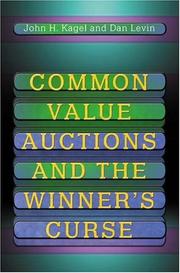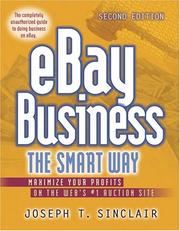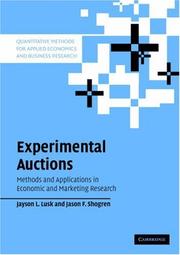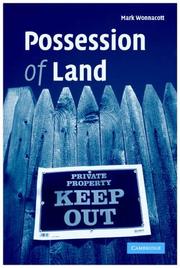| Listing 1 - 10 of 17 | << page >> |
Sort by
|
Book
ISBN: 0262528533 0262334720 9780262334723 9780262334730 0262334739 9780262528535 Year: 2015 Publisher: Cambridge MIT Press
Abstract | Keywords | Export | Availability | Bookmark
 Loading...
Loading...Choose an application
- Reference Manager
- EndNote
- RefWorks (Direct export to RefWorks)
Although it is among the oldest of market institutions, the auction is ubiquitous in today's economy, used for everything from government procurement to selling advertising on the Internet to course assignment at MIT's Sloan School. And yet beyond the small number of economists who specialize in the subject, few people understand how auctions really work. This concise, accessible, and engaging book explains both the theory and the practice of auctions. It describes the main auction formats and pricing rules, develops a simple model to explain bidder behavior, and provides a range of real-world examples.
Auctions. --- Dutch auctions --- Vendues --- Bailments --- Commercial law --- Auctions --- E-books
Book
ISBN: 1316028577 1316028097 1316338509 1316029549 1316030024 1107444314 1316017818 1316031942 1316030989 9781316031940 9781316017814 9781107083547 1107083540 9781107444317 1316031462 Year: 2015 Publisher: Cambridge, United Kingdom
Abstract | Keywords | Export | Availability | Bookmark
 Loading...
Loading...Choose an application
- Reference Manager
- EndNote
- RefWorks (Direct export to RefWorks)
Possession is a key concept in both the common and civil law, but it has hitherto received little scrutiny. Law and Economics of Possession uses insights from economics, psychology and history to analyse possession in law, compare and contrast possession with ownership, break down the elements of possession as a fact and as a right, challenge the adage that 'possession is 9/10 of the law', examine possession as notice, explain the heuristics of possession, debunk the behavioural studies which confuse possession with ownership, explore the LightSquared dispute from the perspective of 'possession' of spectrum frequency and provide new insights to old questions such as first possession, adverse possession and property jurisdiction. The authors include leading property scholars, who examine possession laws in, among others, the USA, UK, China, Taiwan, Japan, Germany, France, Israel, the Netherlands, Spain, Portugal, Italy, Austria.
Possession (Law) --- Bailments --- Property --- Real property --- Things (Law)
Book
ISBN: 1474400930 0748693653 9780748693658 9780748693641 0748693645 Year: 2014 Publisher: Edinburgh Edinburgh University Press
Abstract | Keywords | Export | Availability | Bookmark
 Loading...
Loading...Choose an application
- Reference Manager
- EndNote
- RefWorks (Direct export to RefWorks)
Possession is a topic which has been researched for centuries, yet there is a surprising dearth of comparative materials and also very little available in English about the law of non-Anglophone jurisdictions. Leaving aside the question of what possession is, this analysis concerns itself with the law's response to 'possession'. The volume comprises contributions from some very distinguished scholars from the civilian tradition (Germany, Italy) as well as the common law (England) and mixed legal systems (Quebec, Scotland, South Africa). Key Features * Written by an international set of contributors from jurisdictions including Germany, Italy, England, Quebec, Scotland and South Africa *Looks at common law, civil law and combined jurisdictions *The first synthesis of theory on the subject of possession * The Contributors: Craig Anderson, Lecturer in Law at Robert Gordon University, Aberdeen Raffaele Caterina, Professor of Law at the University of Turin Eric Descheemaeker, Lecturer in European Private Law at the University of Edinburgh Simon Douglas, CUF Lecturer in the University of Oxford and Fellow and Tutor in Law at Jesus College, Oxford Yaëll Emerich, Associate Professor at the Faculty of Law, McGill University, Montreal Robin Hickey, Senior Lecturer in Law at Queen's University Belfast Duard Kleyn, Professor of Law at the University of Pretoria Lena Kunz, Post-doctoral Researcher at the Institute of Legal History, University of Heidelberg Thomas Rüfner, Professor of Law at the University of Trier and Judge on the Court of Appeal in Koblenz
Possession (Law) --- Bailments --- Property --- Real property --- Things (Law) --- Comparative law --- Law of real property
Book
ISBN: 3111347389 9783111347387 Year: 2016 Publisher: Berlin Boston
Abstract | Keywords | Export | Availability | Bookmark
 Loading...
Loading...Choose an application
- Reference Manager
- EndNote
- RefWorks (Direct export to RefWorks)
No detailed description available for "Die Entstehung der Vorschriften des BGB über Besitz und Eigentumsübertragung".
Possession (Law) --- Transfer (Law) --- Alienation (Law) --- Acquisition of property --- Property --- Singular succession --- Bailments --- Real property --- Things (Law) --- Germany.


ISBN: 0691016674 9786612158759 1282158759 1400830133 9781400830138 9780691016672 9781282158757 6612158751 Year: 2009 Publisher: Princeton, NJ
Abstract | Keywords | Export | Availability | Bookmark
 Loading...
Loading...Choose an application
- Reference Manager
- EndNote
- RefWorks (Direct export to RefWorks)
Few forms of market exchange intrigue economists as do auctions, whose theoretical and practical implications are enormous. John Kagel and Dan Levin, complementing their own distinguished research with papers written with other specialists, provide a new focus on common value auctions and the "winner's curse." In such auctions the value of each item is about the same to all bidders, but different bidders have different information about the underlying value. Virtually all auctions have a common value element; among the burgeoning modern-day examples are those organized by Internet companies such as eBay. Winners end up cursing when they realize that they won because their estimates were overly optimistic, which led them to bid too much and lose money as a result. The authors first unveil a fresh survey of experimental data on the winner's curse. Melding theory with the econometric analysis of field data, they assess the design of government auctions, such as the spectrum rights (air wave) auctions that continue to be conducted around the world. The remaining chapters gauge the impact on sellers' revenue of the type of auction used and of inside information, show how bidders learn to avoid the winner's curse, and present comparisons of sophisticated bidders with college sophomores, the usual guinea pigs used in laboratory experiments. Appendixes refine theoretical arguments and, in some cases, present entirely new data. This book is an invaluable, impeccably up-to-date resource on how auctions work--and how to make them work.
Auctions --- Paradoxes --- Value --- 381.17 --- Standard of value --- Cost --- Economics --- Exchange --- Wealth --- Prices --- Supply and demand --- Dutch auctions --- Vendues --- Bailments --- Commercial law --- Auctions. --- Paradoxes. --- Value. --- E-books
Book
ISBN: 0814427707 9780814427705 Year: 2004 Publisher: New York AMACOM
Abstract | Keywords | Export | Availability | Bookmark
 Loading...
Loading...Choose an application
- Reference Manager
- EndNote
- RefWorks (Direct export to RefWorks)
Internet auctions. --- Auctions --- Dutch auctions --- Vendues --- Bailments --- Commercial law --- Online auctions --- Electronic commerce --- Computer network resources. --- eBay (Firm) --- eBay Inc. --- ebay.com
Book
ISBN: 9781841135755 Year: 2010 Publisher: Oxford Hart Publishing
Abstract | Keywords | Export | Availability | Bookmark
 Loading...
Loading...Choose an application
- Reference Manager
- EndNote
- RefWorks (Direct export to RefWorks)
Acquisition of property --- Lost articles --- Personal property --- Possession (Law) --- Bailments --- Property --- Real property --- Things (Law) --- Articles, Lost --- Lost objects --- Objects, Lost --- Personal belongings --- Treasure troves --- Property, Acquisition of --- Transfer (Law) --- Law and legislation

ISBN: 0814472028 0814427715 9780814427712 9780814472026 Year: 2003 Publisher: New York AMACOM
Abstract | Keywords | Export | Availability | Bookmark
 Loading...
Loading...Choose an application
- Reference Manager
- EndNote
- RefWorks (Direct export to RefWorks)
Now in a fully revised second edition, the completely unauthorized guide to doing business on eBay!
BUSINESS & ECONOMICS --- E-Commerce / General (see also COMPUTERS / Electronic Commerce) --- Internet auctions. --- Auctions --- Computer network resources. --- eBay (Firm) --- Dutch auctions --- Vendues --- Online auctions --- eBay Inc. --- ebay.com --- Bailments --- Commercial law --- Electronic commerce --- Internet auctions --- Computer network resources --- E-books

ISBN: 9780521855167 0521855160 9780521671248 0521671248 9780511611261 9781139129237 1139129236 0511611269 1107176743 128332976X 9786613329769 1139134272 1139131486 0511503989 0511506120 Year: 2007 Publisher: Cambridge New York Cambridge University Press
Abstract | Keywords | Export | Availability | Bookmark
 Loading...
Loading...Choose an application
- Reference Manager
- EndNote
- RefWorks (Direct export to RefWorks)
Economists, psychologists, and marketers are interested in determining the monetary value people place on non-market goods for a variety of reasons: to carry out cost-benefit analysis, to determine the welfare effects of technological innovation or public policy, to forecast new product success, and to understand individual and consumer behavior. Unfortunately, many currently available techniques for eliciting individuals' values suffer from a serious problem in that they involve asking individuals hypothetical questions about intended behavior. Experimental auctions circumvent this problem because they involve individuals exchanging real money for real goods in an active market. This represents a promising means for eliciting non-market values. Lusk and Shogren provide a comprehensive guide to the theory and practice of experimental auctions. It will be a valuable resource to graduate students, practitioners and researchers concerned with the design and utilization of experimental auctions in applied economic and marketing research.
Auctions. --- Consumers' preferences --- Mathematical models. --- Auctions --- consumentengedrag --- kwantitatieve methoden --- marketing research --- mathematische modellen, toegepast op bedrijfsleven --- mathematische modellen, toegepast op economie --- Dutch auctions --- Vendues --- Bailments --- Commercial law --- Mathematical models --- Business, Economy and Management --- Economics

ISBN: 110717113X 1281085952 9786611085957 0511349882 1139132474 0511350783 0511348045 0511495528 0511349017 9780511346101 0511346107 9780511349010 9780511349881 9780511495526 0521868998 9780521868990 9781107406346 9781281085955 6611085955 9781139132473 9780511350788 9780511348044 110740634X 9781107406346 Year: 2006 Publisher: Cambridge New York Cambridge University Press
Abstract | Keywords | Export | Availability | Bookmark
 Loading...
Loading...Choose an application
- Reference Manager
- EndNote
- RefWorks (Direct export to RefWorks)
Nothing is more important in English land law than 'possession'. It is the foundation of all title, rights and remedies. But what exactly is it, and why does it still matter? This book, first published in 2006, is about the meaning, significance and practical effect of the concept of possession in contemporary land law. It explains the different meanings of possession, the relationship between possession and title, and the ways in which the common law and equity do, and do not, protect possession. The rights and remedies of freeholders, tenants and mortgage lenders, between themselves and against third parties, are all to some extent dependent on questions of status and possession. This book shows how. It is designed to provide an understanding of the basic principles for the student, and answers to difficult, real problems for the practitioner.
Land tenure --- Possession (Law) --- Bailments --- Property --- Real property --- Things (Law) --- Agrarian tenure --- Feudal tenure --- Freehold --- Land ownership --- Land question --- Landownership --- Tenure of land --- Land use, Rural --- Land, Nationalization of --- Landowners --- Serfdom --- Law and legislation --- Law --- General and Others
| Listing 1 - 10 of 17 | << page >> |
Sort by
|

 Search
Search Feedback
Feedback About UniCat
About UniCat  Help
Help News
News